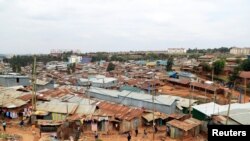In a report released Tuesday, Human Rights Watch accused the Kenyan government of failing to properly handle a cash transfer program intended to help the poor during the COVID-19 pandemic. The rights group says the money instead went to people connected with officials and politicians.
Anette Okumu, 42, lost her business due to COVID-19. She and her neighbors in the Kibera section of Nairobi registered for a government cash support program in April to help her feed her nine children.
Okumu says her husband was jobless, and she really needed that money because she has a child who has sickle cell anemia and the disease requires her to feed her child healthy food. Okumu says she was hopeful that she would receive help from the government. She says she did not get the money — but others did.
In May of last year, President Uhuru Kenyatta ordered the Treasury to release some $100 million to support the country’s most vulnerable people for at least eight months.
The head of Human Rights Watch in East Africa, Otsieno Namwaya, says that money never served its intended purpose.
“Most of the households that were supposed to have received support from the government never received anything," he said. "The few who received something did not receive the amount the government said it had sent to them. The majority over a period of eight months received 3,000 – 4,000 shillings. The government was saying it was sending a total of 35,000 for the period of eight months.”
The Washington-based rights group says its investigators spoke to 136 government employees and Nairobi residents for its eight-month study.
The researchers found that the cash transfer program lacked transparency in multiple ways, from the registration process to the distribution of funds.
A report released by the Office of the Auditor-General in April 2021 said that some $4 million was dispersed to help nearly 100,000 Kenyans in a poor section of Nairobi for one month.
But the investigators said they could not verify the identities and addresses of more than 97,000 alleged recipients. Their report concluded “the lawfulness and utilization of the $4 million could not be confirmed.”
Namwaya says most of the money instead went to friends and family of officials and the employees of certain government agencies.
“Politicians and government officials actually ensured that official aides, people working offices and relatives were benefiting from the money when the evidence suggests that these people did not deserve to get the money. While the people who really deserve the money, people who were going hungry for even as far as four days a week were not getting the money,” he said.
The program was run by the Ministry of Labor and Social Protection. VOA reached out to the principal secretary of the ministry for comment but received no response.
Human Rights Watch is calling on Kenyan authorities to investigate the issue and extensively review and strengthen internal mechanisms for implementing such programs in the future.




